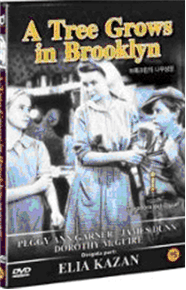A ‘respite movie’ from 1945 with a solid message (7.5/10)
 Katie Nolan: Flossie Gaddis died last night.
Katie Nolan: Flossie Gaddis died last night.
Johnny Nolan: The poor baby. It was nice that her Mama got her all them pretty dresses.
Katie Nolan: Only now the poor thing will have to lie in Potter’s Field!
Johnny Nolan: But at least she had the dresses!
Peggy Ann Garner … Francie Nolan
James Dunn … Johnny Nolan
Dorothy McGuire … Katie Nolan
Joan Blondell … Sissy Edwards
Lloyd Nolan … Officer McShane
James Gleason … McGarrity
Ted Donaldson … Neeley Nolan
Turner Classic Movies (TCM) is having its “31 Days of the Oscars” program, in which during prime time it airs a movie that won Academy Awards, usually for best picture or best actor. Tonight it’s A Tree Grows in Brooklyn, a story about life in the Brooklyn, New York, community in 1912, based on the novel by Betty Smith. I say to myself, “I don’t know anything about this movie, but it’s a catchy title, and it’s supposed to be good.
How wonderful to be able to sit down and enjoy, uninterrupted, a 1945 black-and-white movie from a renowned director—Kazan[1] also directed A Streetcar Named Desire (1951), On the Waterfront (1954), East of Eden (1955), and A Face in the Crowd (1957)—about a father-daughter relationship affected by (his) alcoholism.
All right, so it’s not much of a story, but it’s told from the little girl Francie Nolan’s (Peggy Ann Garner) point of view. To Francie, her father Johnny Nolan (James Dunn) can do no wrong—he clearly dotes on her above her younger brother—; he’s always cheerful, always telling her how good she can be, always minimizing the hardships the family faces because he can’t hold a steady job… due to the bottle. You can call him a cheerful drunk or a free and happy spirit. The title of the movie comes from his insistence to Francie that the only tree previously visible from the Nolan tenement (which was removed) will again sprout up through the concrete.
Fat chance you’re thinking, but you’re supposed to believe that the two of them see it actually growing. It does show the nature of their bond. In modern times, and if Francie were a little older, one might call Francie an “enabler.” But this is 1912 and alcoholism is like so many other things in American culture, the less you deal with it the better chance it will take care of itself. Ignore it and it will go away, that’s the policy. Which is the approach Francie, bless her heart, has to take. In this movie, you really feel how important most girls view their relationship with their fathers: standing back, it’s easy for me to say, “Man, what a crock! Can’t you see he’s playing you? How can you feel anything for a guy like this?!”
But girls will be girls. On the less innocent side, Francie’s mother Katie (terrific understated performance by Dorothy McGuire) has had it up to here with the old man. She hangs with him because that’s what you’re supposed to do in 1912, but the fun times with good-time Charlie have been replaced by a daily grind keeping the home together and finding part time work so the kids can eat. Still, you know, that like Francie, Katie will always have a deep affection for Johnny.
For his part, Johnny knows he has a problem, and also knows he’s powerless against it. He’s an interesting character for sure, as he tries to work all the angles to put himself and his love for the family in first place, while all the time he’s still being pulled down the street to the pub as if by invisible forces. Nor does he want to talk about the problem; his references to it are all distant and pretentious that the problem is a small thing, not some 900-pound gorilla. Then the optimism comes up again, which gets to be a broken record especially with Katie. But he’s a complex, deeply conflicted, sensitive, artistic, loving person and you have to feel for him.
The sad irony is that he means so much to so many people. And you find that out as the plot unfolds, particularly with young Francie who has literary abilities and may have a chance to attend a school to guide her along those paths. An interesting “comic-relief” feature of the movie is the character Sissy Edwards (Joan Blondell), who basically flouts the rules about women and flaunts her wares with the men about town. She’s Katie’s sister and played quite interestingly by Blondell in this movie: meaning she’s a complex character as well, not simply some floozie without integrity or real concern about the people in her life.
A very good little movie, and a story. Thank you, TCM, for continuing to give the species hope for a refreshment toward the literary way… I’m talking about what Neil Postman wrote in Building a Bridge to the 18th Century. And I fully believe we’ll get there, to a ReEnlightenment based on a persistent seeking of conceptual practices… which almost always means good writing. But then maybe I’m prejudiced.
On a side note, the timing for the movie is 1912, and on the streets of Brooklyn you see horses and carriages; very few horseless carriages. The set designers deserve some kudos. (James Dunn as Johnny Nolan won the Oscar for best-supporting actor, and the film was nominated for best screenplay.) Another side note of particular interest to people who like to keep track of money: Francie and her brother at one point are asked to work part time for a local merchant for $2 a week. This will be a real financial help to the family, too.
Anyway, another time.
This post has been read 1447 times!

